"If you recall or remember something be sure to tell just me… Only me. Do you understand?"
A middle-aged woman walks forlornly through a field of tall grass on a beautiful day. Approaching the camera filming the scene, she stops and slowly begins to dance. So begins "Mother", written and directed by Bong Joon-ho...
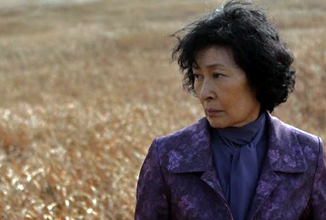 |
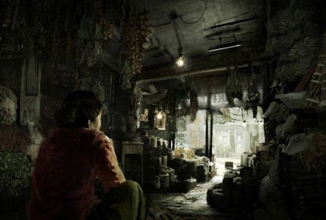 |
Review:
Following this strange, yet affecting, scene we are taken to the (unnamed) mother's place of business in a rundown part of town, where she lives with her son Do-joon and sells homeopathic herbs and roots (as well as performing acupuncture on clients without a licence), and as we watch her cutting herbs with a guillotine, while she keeps both eyes firmly fixed on Do-joon across the street (rather than on the task at hand), it is immediately clear just how protective of him she is. Do-joon is mentally slow, has virtually no attention span or short-term memory and still sleeps in his mother's bed. Twenty-eight years old, he is still a virgin and though all around think he is good looking, his mental limitations mean that he has never had a girlfriend - he is even under the impression that sleeping with someone means exactly that.
When a young girl is killed, police learn that Do-joon had been following her on the night of her death and, with the discovery of evidence near her body linking him to the crime scene, he is arrested and charged with murder.
Knowing that Do-joon "couldn't hurt a water bug", his mother desperately tries to convince the authorities to re-investigate the case but when they refuse she realises that if her son's innocence is to be proved she will have to find the real murderer herself.
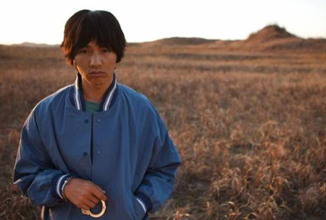 |
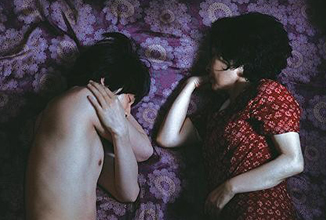 |
Like Bong Joon-ho's previous films, "Mother" deals with small town folk, familial dysfunction and separation, within a tale detailing the lengths to which the mother is prepared to go to protect her son. Do-joon's late father is never mentioned (although he can be fleetingly seen in an old photograph standing beside a young Do-joon - a photograph which is subsequently torn in two, splitting the images of Do-joon and the man, and reinforcing the aforementioned themes) and the circumstances surrounding his death are never discussed but, as "Mother" centres around the bond between mother and son, the lack of a prominent father figure is essential.
Initially, the mother is portrayed as a typical, if slightly over-protective, parent bringing up her child single-handedly within the constraints of what’s morally and legally right, but even though her sole focus is ensuring that Do-joon is safe, that he stays clear of less savoury types and gets the best life that she can give him, it becomes increasingly clear that her moral guidelines are much less set in stone with regard to herself - a perfect example of which is her dislike of the rebellious Jin-tae (Do-joon’s closest friend) and of Do-joon's friendship with him:
In the lead up to murder of the young girl, the mother makes it clear that she will have nothing to do with Jin-tae and wants Do-joon to stop associating with him (even instantly suspecting Jin-tae of being the real murderer when Do-joon is arrested) but she is willing to completely disregards these feelings - without a second thought - when Jin-tae offers to help her find the killer. Her continued practicing of acupuncture without a licence (even though she is regularly reminded that it is illegal), while having pride in her adherence of the law with regard to other matters, is yet another pointer towards her willingness to allow her ideals to change to suit her needs at any given time - as long as she can convince herself that the results will allow her to provide a better existence for her son. There is even an implication that her focus on doing what is in Do-joon's best interests may not always have been the case and, as such, her over-protectiveness and need to keep him near could be said to be caused as much by feelings of guilt as by having the sole responsibility of taking care of him.
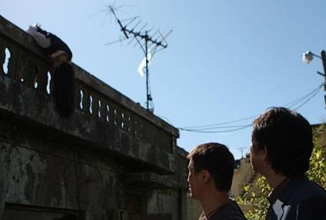 |
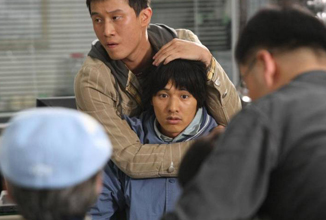 |
Though it is essentially true that Do-joon is the helpless one of the two main characters, unable to survive without his mother, the symbiosis of their relationship becomes increasingly evident as the mother tries to prove her son's innocence. Without him around she is clearly lost and her efforts to find the killer can be seen both as an attempt to help her son by clearing his name and also as helping herself by getting back the one person she really needs in her life. Her later choices and actions are far removed from what is morally right and show us the monster that she allows herself to become but, at the same time, they also reinforce the persona of a mother doing what she feels is necessary to protect and keep her child safe, regardless of the consequences.
However, perhaps the most monstrous choice which the mother makes is her decision to carry on with her chosen path despite being given repeated chances to set things right and finding, instead, a way to block her questionable actions from her mind.
That, in the end, is the only way that she can allow herself to dance.
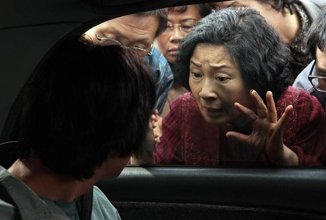 |
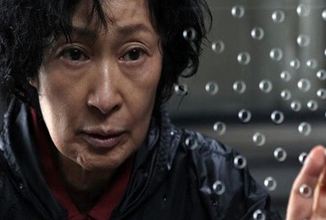 |
Direction, Cast & Crew:
Bong Joon-ho is extremely adept at peppering gritty storylines with black humour, and such is the case with "Mother". The humour is universally well realised, adding a gentle eccentricity - and an extra level of realism - to the personas of the characters. Thankfully it never oversteps the ongoing plot, and even serves to accentuate the dark elements present - almost lulling viewers into a false sense of security. The plot itself is multi-layered with both the main story and sub-plots containing social commentary and subtle references to the underlying themes (already mentioned earlier in this review), which all adds up to a film which, like the characters it contains, has a great deal more to it than first meets the eye.
The film direction is exemplary and the camera work has a deliberate claustrophobia present, with many of the scenes mirroring the grittiness of the story with similarly dark imagery. A great deal of the scenes are filmed at night and even those few which take place on bright days tend to show the mother character in somewhat subdued lighting, looking out at a brighter world, which she almost seems to not be a part of - as is the case in her life. Scenes between the mother and Do-joon regularly reference the theme of separation, the two characters repeatedly standing face to face, in close proximity, but with something between them, keeping them apart - be it a window or prison bars - and the placing of the mother within the screen frame is often uncomfortably close, thereby allowing viewers to empathise with her to a greater degree by experiencing feelings akin to those which she is going through - desperation, claustrophobia, paranoia and a sense of false persecution.
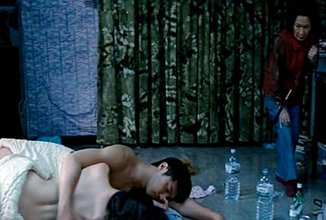 |
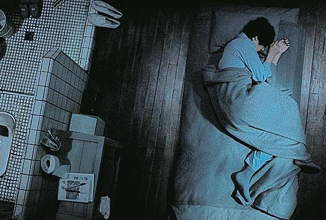 |
The successful use of camera work which is this deliberately intrusive is, of course, utterly dependant on the quality of the cast performances, and in "Mother" they do not disappoint:
Kim Hye-ja, as the mother, is almost a household name in South Korea, known for her over-the-top portrayals of hysterical women in television dramas, but "Mother" is only her third feature film to date. Her acting style here is somewhat subtler than usual (one would assume under the tutelage of Bong Joon-ho), resulting in the mother character appearing to be a ticking time-bomb, constantly on the edge of either breaking down or exploding. At times difficult to watch, but at the same time utterly gripping, her portrayal is simply astounding.
Won Bin makes a major departure from his leading man roles to play Do-joon and gives a memorable and totally believable performance. There is a noticeable chemistry present between the characters of Do-joon and his mother and each of their performances successfully increases the believability of the relationship and viewer empathy for them.
Summary:
How far would you be prepared to go to protect the ones you love, and how would you live with the consequences, and guilt, of any questionable actions taken. In, perhaps, his most accomplished film to date, Bong Joon-ho successfully shows us how fine the line, between being a mother and becoming a monster, really can be.
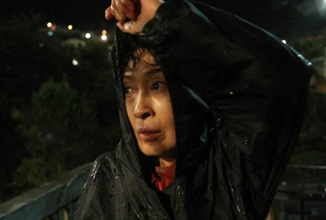 |
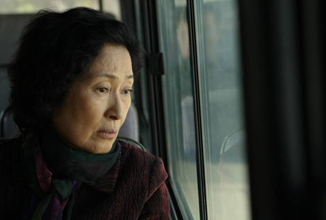 |
DVD:
The DVD used for this review is the Korean Region 3, 2-Disc Special Edition (First Press Limited Edition), which has an anamorphic transfer presented in a 2.35:1 aspect ratio. The picture is stunningly clear, with good colour balance throughout and is free of ghosting and image artifacts. The sound is a choice of Dolby Digital 5.1 and Dolby Digital 2.0, both of which are beautifully crisp. Excellent subtitles are provided for the main feature but English speaking viewers should be aware that there are no English subtitles available for any of the extras.
DVD Details:
Title: Mother (2009) (DVD) (2-Disc) (Special Edition) (First Press Limited Edition) (Korea Version)
Cast: Kim Hye-ja, Won Bin, Jin Gu
Director: Bong Joon-ho
Release Date: 11th November 2009
Language: Korean
Subtitles: English, Korean
Country of Origin: South Korea
Picture Format: NTSC
Disc Format(s): DVD (2 Discs)
Region Code: 3 - South East Asia
Rating: III
Publisher: CJ Entertainment
* Screen format: 2.35:1 Anamorphic Widescreen
* Sound: Dolby Digital 5.1/2.0
* Extras:
Disc 1:
Audio Commentary
Disc 2:
1. Mother, son and murder (making)
2. Keywords
- Murder
- Sex
- Son
- Mom
3. Hye-ja, Bong
4. Deleted Scenes with Commentary
5. Mom's Nearby
6. Artists
- Arm, Space (Art, location)
- Anamorphic (Cinematographer interview)
- Wu, BJ Thomas - Day (Music making)
7. Steel (locations)
8. Trailers
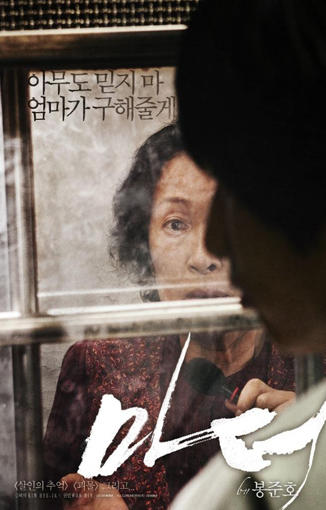 |
|














